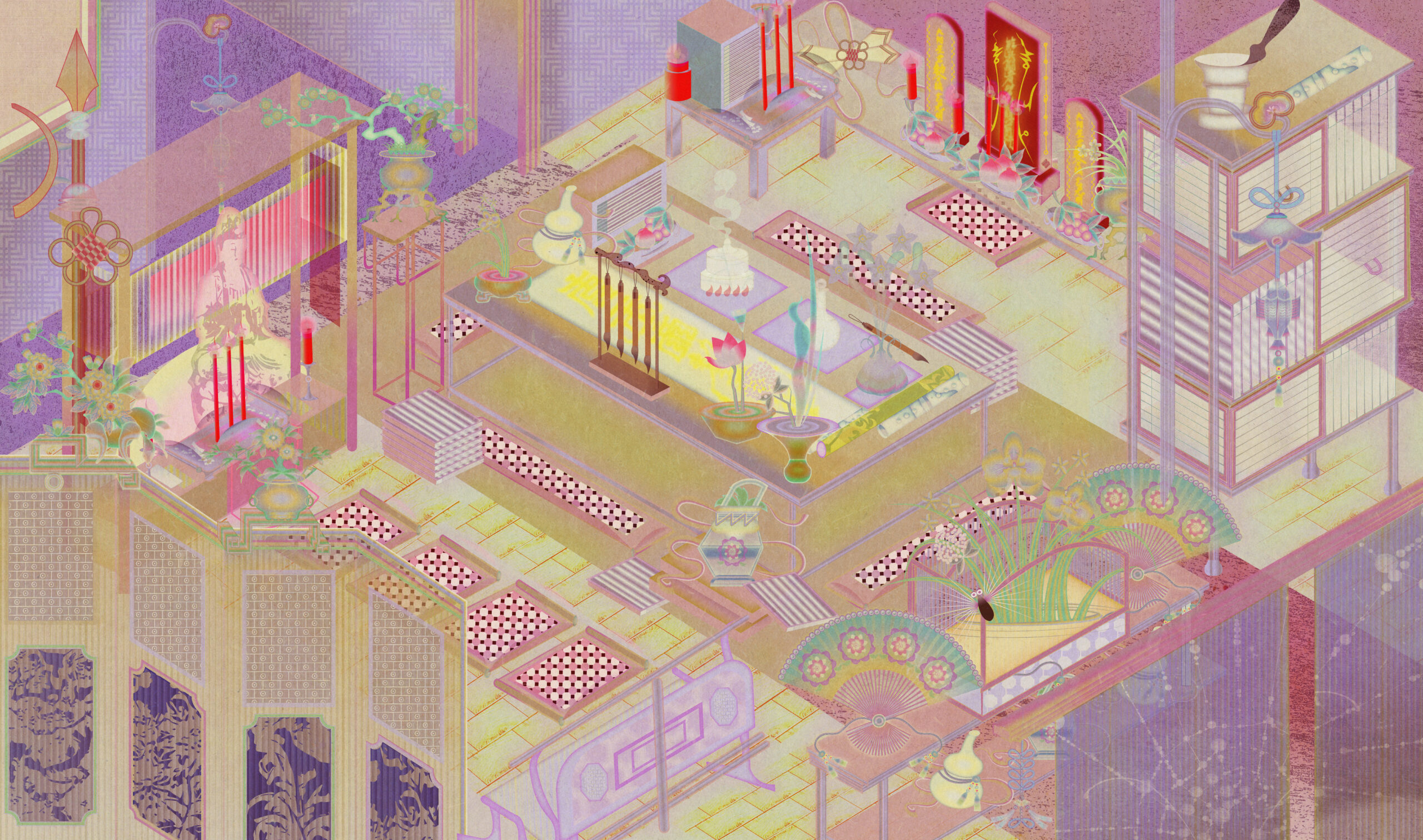YANGJIANG GROUP: THE GARDEN OF PINE-ALSO FIERCE THAN TIGER II
| October 1, 2010 | Post In LEAP 5

If identity and personal memory maintain a certain degree of unity, then Yangjiang Group’s exhibition “The Garden of Pine—Also Fierce Than Tiger II” at Tang Contemporary Art in Beijing traps people in the dislocation between personal identity and historical memory. The first sight upon entering the exhibition hall is a scene cast entirely in paraffin wax. Winding pines, representing ancient scholars’ strength of character, gather on the earthen floor; in the center of the hall two tables are on display, strewn with a mess of drinking cups and used saucers left in the wake of a gluttonous binge. The night before the exhibition’s opening, the artists and their friends feasted, gambled, and—it appears—lost a great deal of money. Calligraphy written with the artists’ tree branches and grease paint hangs on the wall, detailing their wagers. The two side rooms are empty, and on their walls, papers covered in numbers display a cascade of winnings and losses. The overall atmosphere of the exhibition hall is cold and imposing, as if everything that has transpired there has become a thing of the past, a historical relic frozen beneath paraffin wax. The only source of noise is a large projection screen where the images and voices of the raucous feast still play out, but seem to come from a far-off place.
In its past life, Yangjiang Group was Yangjiang Calligraphy Group, a smaller association of artists formed in 2002 by the likes of Zheng Guogu, Chen Zaiyan, and Sun Qinglin. Yangjiang, a small town in the Pearl River Delta region, is permanent base camp for Yangjiang Group artists. Upon showing their work, the artist have no reservations about carrying the underlying characteristics of their city with them into the exhibition environment, an approach that lends a certain grassroots temperament to their works, the feeling of a kind of cultural ecological sampling. The artists are also keen to investigate and re-investigate Chinese calligraphy as a medium instrumental to the experimental collocation of contemporary social phenomena with contemporary social perceptions; the result of this exploration is the spark of possibility and first-hand experience.
Even moreso with this year’s works—among them the “Indoor Garden (Pine Garden)” series, Urban and Rural Planning Act, Ink at the Waking Hour, and Last Round, works originally exhibited in 2009—the Yangjiang artists make a collage of traditional Chinese imagery (calligraphy, gardens, pines, waterfalls, and so on), based on customs and phenomena personal to the their own living circumstances. Free of inhibition, they have carried out an experiment to hybridize personal experience and public memory. This process is most fully manifested in “Also Fierce Than Tiger II.” As far as the Yangjiang Group is concerned the experience of drinking, gambling, and dining together is an immersion in everyday life, whereas the art of calligraphy, and the process of thinking about and engaging in practice of artistic creation are elemental to another kind of life. For the ancients, whether they were in a garden or practicing calligraphy, learning was experienced through action, and experience was pure and personal. But today, these once personal activities have become a kind of cultural inheritance, diluted amidst public memory. Whether we confront globalization or other social and cultural transformations, just as moments are fleeting to time, time still carries its own past with it, and time still flows into the future. When personal identity and historical memory intermix, the residue freezes over what was once live flame, just as it seems that moments in the exhibition are left frozen under the silent wax. “Also Fierce Than Tiger II” implies a transformation of time and space. Within unstoppable time, we hope or expect that the memory of an isolated moment of complicated, absurd life, once internalized, will hold a suitable answer that we can relate to personally. But quite possibly, each of us will need something completely different. Li Xiaonan

